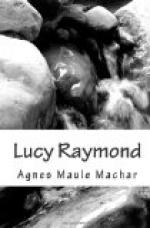There was, indeed, one of her schoolmates, a Miss Eastwood, a boarder at Mrs. Wilmot’s, in whom, from her sweet, serious manner and appearance, and from some other tokens, she thought she might have found a congenial friend. But Miss Eastwood was a little older than herself, and Lucy’s natural shyness was increased by the impression that she rather avoided her and Stella, probably from knowing that Mr. Brooke’s was a thoroughly worldly family, and supposing that Lucy must be like her cousins in this respect. Miss Eastwood in this was acting conscientiously; yet such a determined avoidance of those who appear to be worldly in their principles of action, though founded on the desire of keeping out of temptation, sometimes leads to great mistakes. Real Christian sympathy may sometimes be found where from circumstances there may seem to be least appearance of it; and even where it does not exist, influence for good might be exerted over those whom distrust must necessarily repel. He who sat with publicans and sinners, while He enjoins His followers to be “not of the world,” even as He was not of the world, cannot surely desire them to avoid all opportunities, naturally occurring, of coming in contact with those who may not be like-minded; and if Christians would always show their true colours uncompromisingly, while coming near to others, as God’s providence opens opportunity, they would both do more good and find sympathy and fellowship oftener than they expect.
Of all the inmates of her uncle’s house, little Amy was the one in whom Lucy found the greatest congeniality. Her readings to her, and her teaching about Jesus, seemed to have satisfied a craving of the child’s little heart, and she drank in the truths which Lucy tried to explain to her, with the eagerness of one who had been thirsting for the living water. Indeed she needed very little explanation; it seemed as if the Spirit of God was her teacher, instructing her in things that might have seemed too deep for so young a child to grasp,—though indeed there may be less difference than we often imagine between the mind of a child and that of the wisest man, as regards their power of comprehending truths that are too infinitely profound for the greatest human intellect to fathom.
Amy had from her infancy been so delicate, that she had been in a great measure confined to the nursery all her life; and not being nearly so winning and attractive as Stella, she had never been so great a favourite with her brothers and sisters, who, never having taken the trouble of drawing her out, considered her rather uninteresting. The death of a fine little boy, a little older than Amy, had strangely had the effect upon her mother of making her turn away, almost with a feeling of impatience, from the unattractive, ailing child that had been spared, while her noble little boy, so full of beauty and promise, had been taken. Amy had been left almost entirely to her nurse, who had taught her some of the simple




